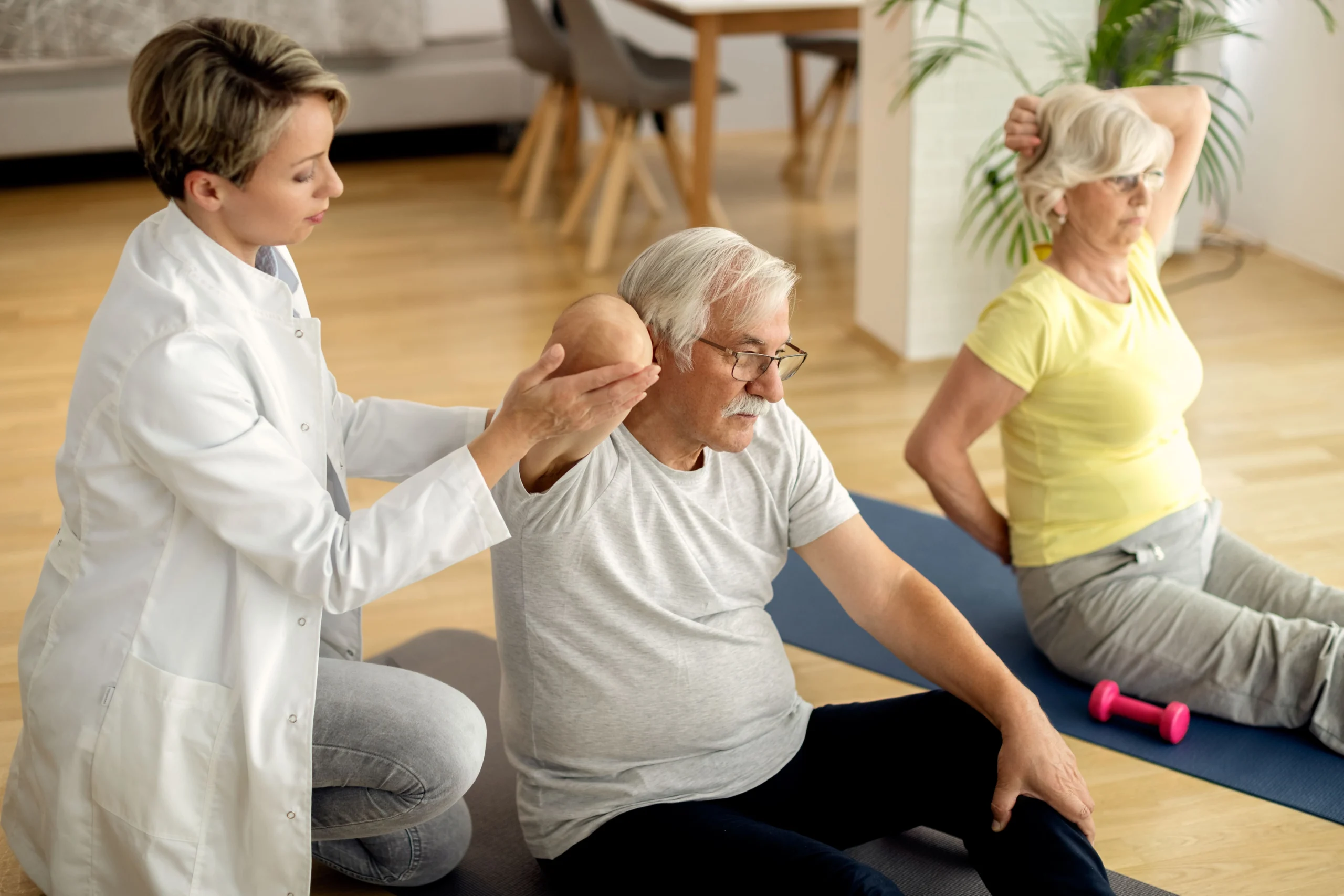
Synapse Physiotherapy
Introduction
Falls are one of the leading causes of injury and hospitalisation among the elderly, making fall prevention a critical aspect of senior healthcare. As people age, the risk of losing balance and sustaining falls increases due to declining muscle strength, impaired mobility, and age-related health conditions. One highly effective method for reducing this risk is home physiotherapy. This approach allows elderly individuals to receive targeted therapy in the comfort and safety of their own homes, helping them improve balance, strength, and confidence in daily activities.
Home physiotherapy represents a revolutionary approach to elderly healthcare, bringing professional physiotherapy services directly to patients’ residences. This specialised form of home physiotherapy focuses on creating safer living environments whilst delivering targeted interventions that reduce fall risks among senior citizens. The familiar environment reduces anxiety, whilst personalised home physiotherapy programmes address specific household challenges that contribute to fall incidents.
Home physiotherapy for elderly fall prevention not only focuses on physical rehabilitation but also incorporates environmental assessments and education to reduce hazards that contribute to falls. By working one-on-one with a physiotherapist at home, seniors benefit from personalised exercise routines and mobility training designed specifically to address their limitations. This customised care can significantly lower the likelihood of falls, enhance independence, and promote a better quality of life. With the increasing demand for ageing-in-place solutions, home physiotherapy has emerged as a vital service in keeping seniors safe and active where they live.
Why Home Physiotherapy Is Essential for Elderly Care
The demand for home physiotherapy continues to grow as more elderly individuals prefer receiving treatment within their familiar environment. Home physiotherapy services offer comprehensive rehabilitation that addresses multiple aspects of elderly care, from mobility enhancement to fall prevention strategies. Research demonstrates that home physiotherapy achieves superior outcomes compared to traditional clinic-based treatments for elderly patients.
Why Falls Happen Among the Elderly
Falls don’t occur in isolation; they are usually the result of multiple factors:
Muscle Weakness: Age-related muscle loss (sarcopenia) reduces stability and reaction time
Poor Balance and Coordination: Impaired proprioception and vestibular function affect balance
Chronic Conditions: Stroke, arthritis, diabetes, and neurological disorders like Parkinson’s disease can compromise movement
Vision or Hearing Impairments: Reduced sensory perception contributes to spatial disorientation
Polypharmacy: Multiple medications can lead to dizziness or drowsiness
Environmental Hazards: Loose rugs, poor lighting, and cluttered pathways increase fall risks
A comprehensive fall prevention plan must address both internal physical limitations and external environmental factors through structured home physiotherapy interventions.
What Is Home Physiotherapy?
Home physiotherapy is the delivery of physiotherapy services in a person’s residence rather than at a clinic or hospital. For older adults, this setting provides both physical and psychological comfort. A licensed physiotherapist visits the home to evaluate the individual’s condition, mobility, and surroundings, then tailors a treatment plan that includes exercises, mobility training, and fall risk education.
Professional home physiotherapy incorporates advanced assessment tools and evidence-based interventions specifically designed for the home environment. This personalised approach ensures that each home physiotherapy session addresses the unique challenges presented by the patient’s living space and individual health requirements.
Benefits of Home Physiotherapy for Fall Prevention
Individualised Care Plans
Therapists can create customised routines based on the person’s unique physical status, medical history, and living environment through comprehensive physiotherapy services home physiotherapy assessments.
Improved Safety
The physiotherapist can identify home hazards like poor lighting or slippery floors and recommend modifications during home physiotherapy visits.
Greater Adherence and Engagement
Elderly patients often feel more motivated and less intimidated when exercising in a familiar setting, making home physiotherapy sessions more effective.
Caregiver Involvement
Family members can observe sessions, learn proper techniques, and help with exercises between home physiotherapy visits.
Functional Improvement
Therapy focuses on real-life tasks like getting in and out of bed, standing from a chair, and walking around the house—skills that directly impact fall risk through targeted home physiotherapy interventions.
The Science Behind Home Physiotherapy Effectiveness
Studies indicate that consistent home physiotherapy participation leads to significant improvements in elderly patient outcomes. Home physiotherapy programmes demonstrate a 40% reduction in fall-related hospitalisations, improved confidence in daily activities, enhanced quality of life measures, and reduced healthcare costs through prevention. According to recent research, telephysiotherapy was more effective than traditional rehabilitation, significantly improving the physical and psychological status of elderly patients.
Key Components of a Fall Prevention Program
A robust home physiotherapy program designed for fall prevention typically includes comprehensive assessment and treatment protocols.
Initial Assessment
The physiotherapist begins with a thorough evaluation of:
Strength, balance, and flexibility
Walking patterns (gait analysis)
Functional mobility (e.g., Timed Up and Go Test)
Fall history and contributing medical conditions
Home safety and layout assessment
This comprehensive home physiotherapy assessment forms the foundation for all subsequent treatment planning.
Balance Training
Balance is a critical component of fall prevention within home physiotherapy programmes. Exercises may include:
Tandem and single-leg stands
Weight-shifting and reaching activities
Step-ups or obstacle navigation
Balance tools like foam pads or wobble boards
Strength Building
Weak muscles are a major contributor to falls, making strength training essential in home physiotherapy. Targeted strength exercises often focus on:
Leg muscles (quads, hamstrings, calves)
Core muscles for posture and stability
Resistance bands or light weights for progressive training
Mobility and Gait Training
Home physiotherapy practitioners guide clients through walking drills and transitions:
Walking with or without assistive devices
Practising step turns, pivoting, and navigating tight spaces
Training for uneven surfaces or steps if applicable
Functional Exercises
Tasks are designed to mimic daily living activities within home physiotherapy sessions:
Sit-to-stand from a chair
Bed transfers and bathroom access
Practising with assistive devices like walkers and canes
Flexibility and Joint Mobility
Stretching helps maintain range of motion, especially in the hips, knees, and ankles through home physiotherapy interventions:
Hamstring and calf stretches
Hip flexor and back mobility drills
Gentle yoga-inspired movements for posture
Home Environment Modifications
The physiotherapist may suggest practical changes to reduce fall risks during home physiotherapy assessments:
Install grab bars in the bathroom
Remove loose rugs and clutter
Add night lights in hallways and staircases
Use non-slip mats in the kitchen and bathroom
Specialised Home Physiotherapy Techniques
Professional home physiotherapy incorporates several advanced techniques designed for various conditions:
Comprehensive Home Safety Evaluations
Home physiotherapy practitioners conduct thorough environmental assessments, identifying potential hazards and recommending practical modifications tailored to each residence.
Personalised Exercise Protocols
Each home physiotherapy session includes tailored exercises designed for the individual’s specific physical limitations and home layout, ensuring maximum effectiveness and safety.
Family Education Components
Home physiotherapy services extend beyond patient treatment to include caregiver training and family involvement strategies, creating a comprehensive support network.
Education and Safety Awareness
Knowledge is a key defence against falls through structured home physiotherapy education:
Teaching proper use of mobility aids
Instruction on safe transfer techniques
Encouragement of regular hydration and balanced nutrition
Guidance on when to seek medical help
Technology and Fall Prevention
Technology can enhance home physiotherapy by:
Using video consultations for remote support and monitoring
Wearable fitness trackers to monitor activity and movement quality
Mobile apps that provide exercise reminders and progress tracking
Fall detection systems to alert caregivers or emergency services if a fall occurs
Combining in-person home physiotherapy with digital tools can reinforce outcomes and provide ongoing reassurance for seniors and their families.
Long-term Benefits of Home Physiotherapy
Research consistently demonstrates that home physiotherapy programmes yield superior long-term outcomes for elderly patients. These benefits include sustained improvements in mobility, reduced fear of falling, enhanced social engagement, and maintained independence within the home environment.
The cost-effectiveness of home physiotherapy makes it an attractive option for healthcare systems seeking to reduce hospital admissions and emergency department visits related to fall injuries among the elderly population.
Challenges and Solutions
Despite the advantages, some obstacles may hinder home physiotherapy implementation:
Access to therapists: Rural or remote areas may have fewer available professionals
Cost and Insurance: Not all insurance plans cover home-based services
Patient Motivation: Seniors may resist exercise or lack confidence in their abilities
Solutions include community programmes, government-funded home care options, and regular family involvement to boost compliance and morale. Healthcare providers increasingly recognise the value of home physiotherapy in comprehensive elderly care planning.
Conclusion
Home physiotherapy for elderly fall prevention is a highly effective, personalised, and convenient solution that addresses both the physical and environmental causes of falls. By improving strength, balance, mobility, and confidence, this approach empowers older adults to maintain independence while reducing their risk of injury.
Home physiotherapy stands as an indispensable healthcare solution for elderly fall prevention, combining professional expertise with the comfort of familiar surroundings. As healthcare systems increasingly recognise the value of preventive care, home physiotherapy programmes continue expanding to serve growing populations of seniors choosing to age in place.
The integration of modern technology with traditional home physiotherapy techniques creates opportunities for enhanced monitoring and improved outcomes. Through comprehensive home physiotherapy services, elderly individuals can maintain independence whilst receiving the professional support necessary for safe, confident living.
As the population continues to age and more seniors choose to live independently, integrating home physiotherapy into healthcare routines becomes not only beneficial but essential. Families, caregivers, and healthcare providers should work together to make home physiotherapy more accessible, helping seniors lead safer, more fulfilling lives in the comfort of their homes. For professional guidance and personalised treatment plans, contact our home physiotherapy specialists who can develop targeted interventions for your specific needs.
Tags :

Back & Neck Pain
Conditions such as stiffness, postural abnormalities and muscle overuse from prolonged desk work at the office or home is more prevalent than most would think. We provide the necessary tools to fix you up and educate you on ergonomics which can unload unnecessary stress.
- Spine & Core Rehabilitation
- Strength & Conditioning Programme
- Pain Management
- Biomechanical Assessment
- Sports Physiotherapy
- Group Class
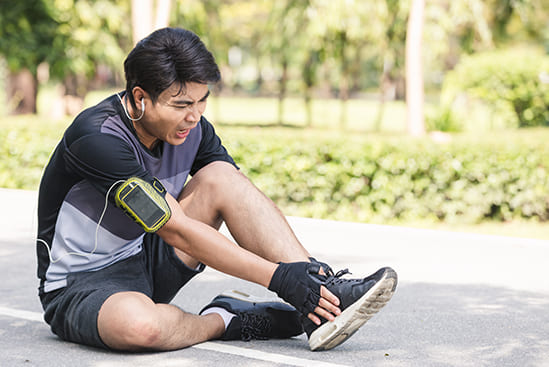
Sports Injuries
Rolled ankles, jarred knees, impinged shoulders are few conditions in the plethora of sports injuries which can hamper performance and limit our enjoyment of sports. Physiotherapy not only treats the symptoms of these conditions but propels your overall fitness to greater heights.
- Strength & Conditioning Programme
- Pain Management
- Biomechanical Assessment
- Sports Physiotherapy
- Shockwave Therapy
- Group Class

Work Desk Injuries
Conditions such as stiffness, postural abnormalities and muscle overuse from prolonged desk work at the office or home is more prevalent than most would think. We provide the necessary tools to fix you up and educate you on ergonomics which can unload unnecessary stress.
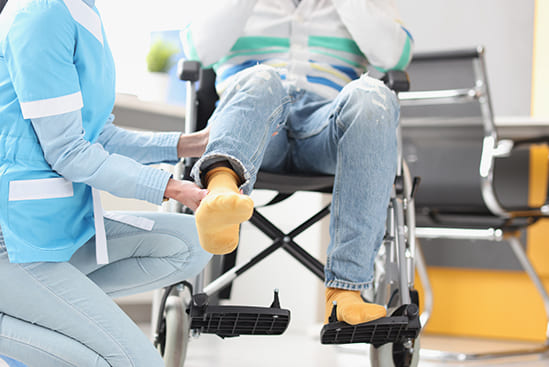
Pre-Post-Surgical Conditions
Surgery involves going through preparation both before and after. Physiotherapists play a vital role in getting your body ready for surgeries with circulatory, breathing and strengthening exercises. After the procedure, let us be there for your recovery and rehabilitation, taking it one step at a time.

Scoliosis & Postural Abnormalities
The way we stand, sit, walk and sleep has influence over our posture and the overall balance of muscles controlling its alignment. A comprehensive screening can be done by our physiotherapists to detect abnormalities, which we will aid in correcting.
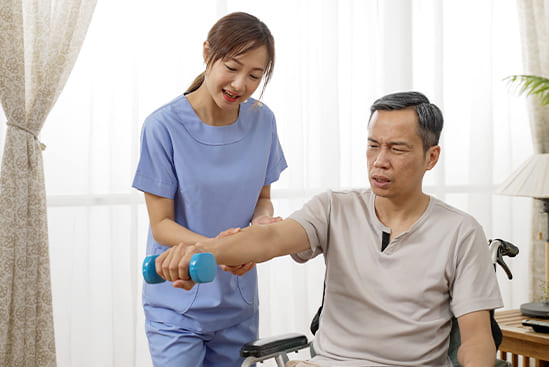
Neurological Conditions
Neurological disabilities such as stroke, nerve compression and neuropathies can be barriers for patients to live life to its fullest. We at Synapse are committed to help you overcome these hurdles by ensuring functional mobility and quality of life is at its optimum by providing the right treatment and exercises.
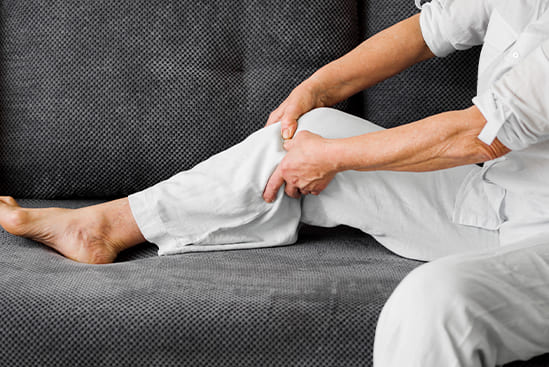
Osteoarthritis & Rheumatism
Joint degeneration and inflammation happens as the human body grows older, but that does not mean our way of life degenerates as well. Relief your joint pains with a joint effort together with your physiotherapist, who will provide pain-relief treatments and prescribe exercises for your wellbeing.
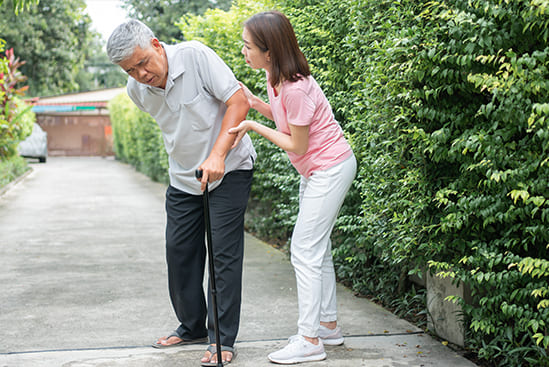
Conditions Relating To Elderly
Common conditions in the older age population include hips & knee pain, back & neck pain, osteoarthritis, rheumatism, fear of falling and many more. Aging and degeneration of bodily function is inevitable, but here at Synapse, we will help you live the best of your life.
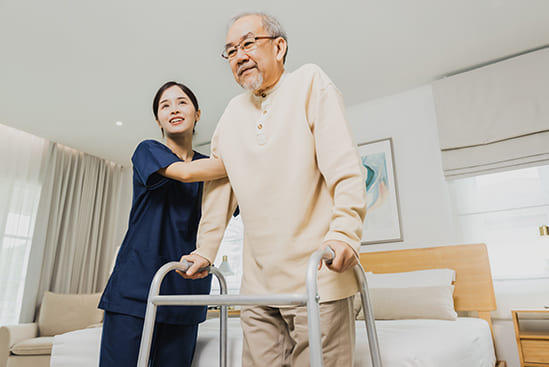
Home Physiotherapy
We understand that some conditions or injuries can make it difficult to receive rehabilitation at our clinic be it mobility or transportation issues. Our objective is to provide you with the same high-quality physiotherapy services at home that you would receive in-clinic.
